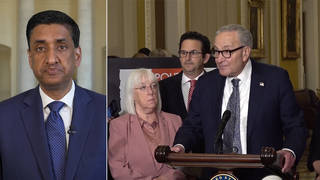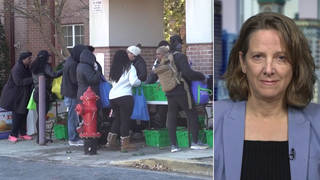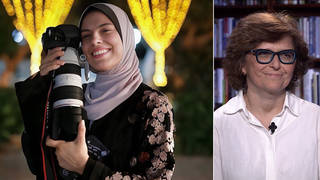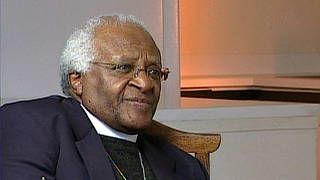
Guests
- Danny Schechterdocumentary filmmaker who has made six nonfiction films on Mandela. He began working in South Africa in the 1960s. He is author of the new book, Madiba A to Z: The Many Faces of Nelson Mandela, which was published in conjunction with the new film Mandela: Long Walk to Freedom.
In part 2 of our interview with Danny Schechter, who has made six nonfiction films on Nelson Mandela, including Mandela in America, he recalls the impact of the anti-apartheid leader’s visit to eight cities, including New York, Detroit, Oakland and Los Angeles. Schechter is also author of the new book, Madiba A to Z: The Many Faces of Nelson Mandela.
Watch part 1 of this interview.
AMY GOODMAN: I’m Amy Goodman, with Juan González. Today, the day after the death of Nelson Mandela, we honor him with our guest today, Danny Schechter, and his film, the film that he did called Mandela in America. Danny, just introduce the film for us that we’re about to play an excerpt of.
DANNY SCHECHTER: Well, first of all, the visit by Nelson Mandela in 1990 was completely unexpected, and the impact to it and the impact it had was unexpected. We went to a prominent cable network in America trying to get them to—you know, to underwrite this documentary. They threw us out. They said, “No. You know, prominent people come to New York all the time. No big deal,” kind of thing. They were totally wrong. I mean, this visitor filled Yankee Stadium, almost unheard of. And everywhere he went, he was greeted in the streets. A hundred thousand or more people in Harlem turned out to see him. And I was—
JUAN GONZÁLEZ: There was a ticker tape parade, which only happened because David Dinkins was the mayor at the time, because I don’t think any other mayor—any other mayor would have given a ticker tape parade to somebody who had just come out of prison, being as a political prisoner.
DANNY SCHECHTER: Yeah, and he told me, Dinkins, you know, that they had to explain to Nelson Mandela what a ticker tape parade was. He didn’t know. And, in fact, there was no more ticker tape at that time.
JUAN GONZÁLEZ: Right.
DANNY SCHECHTER: They had to import it from Connecticut. But this film is not just about New York. It’s about eight cities in 11 days. I traveled with Mandela to all these different cities. And in each city, there was a different kind of response—in Detroit, led by unions; in Oakland, California, a very multiracial community, led by virtually everyone—Ron Dellums was there; and so, and in L.A., of course, every big star turned out. So it kind of represents America, as well, in that period of 1990, a period of great hope and a period also of great resistance against apartheid. The support for Madiba, the support for the ANC was, you know, pervasive among young people in America. And I tried to capture that in this film. I think it stands up.
AMY GOODMAN: I mean, Yankee Stadium was astounding.
DANNY SCHECHTER: Yeah, I think it stands up as a—you know, as a record of those times, showing how people from all walks of life in America came together, inspired by, unified by Nelson Mandela and the ANC. And I think that we can learn a lot from looking at that experience and seeing not only our successes, but our failures, our weaknesses, as a social movement to be able to pull something like that off. And in my book, I got a chance to talk to the people closest to Mandela, who share some pretty extraordinary reflections and recollections about the impact he had on them and on South Africa. And I think it’s a book that looks at him through the prism of the alphabet, A to Z.
AMY GOODMAN: Explain.
DANNY SCHECHTER: Well, you know, I looked at it thematically, that there isn’t just one Nelson Mandela, but there were many. So one section is A for athlete, his adoration of boxers and himself as a boxer. Another is a diplomat, how he in fact became a diplomat. C maybe—and B was a bully. You know, he actually was a very tough guy, and he got very stubborn when he wanted something done, and he fought with his colleagues, sometimes losing, sometimes winning. So he was seen by others as a leader, but not the leader, not—you know, not like some kind of charismatic personality. That differentiated him from Obama today, where we looked at a president as sort of being the top dog. Mandela was a leader of a movement and of a people.
AMY GOODMAN: Madiba, where did he get that name, this term of affection throughout Africa?
DANNY SCHECHTER: Yeah, the term—yeah, it’s a tribal term. He was, you know, a tribal person. And Madiba is—was a honorific term of support that caught on in South Africa, and everybody calls him by that name. But others call him Pata. Others called him “the old man,” you know? It depended. He had a number of different names, but he had a presence in people’s lives, and so everybody thought they knew him, but they all sort of knew one aspect of him.
AMY GOODMAN: Let me ask you this question. In your film, Mandela in America, there are all these images of Nelson Mandela and, of course, his wife at the time, Winnie Mandela, who was with him when he came out of prison, with him when he came to the United States, but that’s not who he ended his life with. At the age of 80, he married Graça Machel, the former wife of Samora Machel. Tell us briefly about who she is.
DANNY SCHECHTER: Yeah, I was also privileged to meet Samora Machel traveling with Jesse Jackson in Mozambique in 1986.
AMY GOODMAN: He was the president.
DANNY SCHECHTER: Before he was killed in a suspicious plane crash. Graça Machel is a remarkable woman, a leader, a activist on behalf of children’s rights. She was a minister in Mozambique, a very accomplished person in her own right. And she’s sort of taken a back seat, didn’t compete with Madiba for attention, but, you know, was at his side for the last 18 years. And I think she, herself, will have a lot of interesting things to say about her experiences in this romance that Madiba had with her, which, you know, in a way, was—when he met Winnie, they were both very young. They were only together for a short amount of time. And, of course, it was one of the great tragedies of his life, and when the two of them, you know, found, when they—when he came out of prison, that they had both changed and wanted different things. And that led to, you know, a divorce that was very painful for both of them. They reconciled, and their families are, you know, part of the same family. But I think Graça Machel brought another dimension into his life, and she is, I believe, one of the heroes of this whole process and also a liberation fighter from Mozambique who deserves a lot of credit in her own right.
JUAN GONZÁLEZ: I wanted to ask you also, when you mentioned the A-to-Zs, D for diplomat, that most people are not aware, unless they’ve studied carefully South African history, that Nelson Mandela was actually doing negotiating with the South African Afrikaner government while he was in prison, long before—
DANNY SCHECHTER: He says—he says no. He says no. He says he was facilitating negotiations, because he hadn’t been appointed by the ANC. But he was in contact with them surreptitiously, covertly, through emissaries, through—to the man who has been left out of so much of this, you know, remembrance today, which is Oliver Tambo, his law partner and the person who kept the ANC alive over all those years. So, you know, Tambo deserves a tremendous amount of credit. He was not even allowed in the United States for many years by—you know, because of Cold War McCarthy-era laws. But he pursued and persisted this vision of bringing this movement together. You know, don’t forget, this movement fought on many fronts. It was involved in sanctions. It was involved in lobbying. It was involved in activism. But it was also involved militarily, in combat with the apartheid system, and the Cuban army came to, you know, the defense of South Africa in Angola, where it defeated the apartheid army, which was invading Angola. And they were beaten back, and that led to the negotiations. So, even Mandela can’t claim credit for everything, and he shouldn’t be given credit to everything, and he wouldn’t give himself credit to everything.
AMY GOODMAN: There is this amazing moment when he came to the United States at a town hall—I think it was in Harlem—where he’s interviewed by Ted Koppel of ABC. And he’s asked why he embraces Yasser Arafat, and he was very staunch. And he said, “I support who supported us.”
DANNY SCHECHTER: That’s absolutely right. When we went to Miami, the Cuban exiles in Miami protested his coming to the city. They had a plane flying around with a big sign calling him a communist and all the rest of it. And he said, “It’s completely unreasonable to criticize us for our support from Fidel Castro and others, when the American government wouldn’t even talk to us.” And, you know, he was very clear about who his friends were. And later on, as you pointed out earlier, Amy, he was one of the few leaders to actually criticize Bush and criticize the war in Iraq very strongly. And he kind of fell from favor in certain American circles as a result of that. He was—what one woman in Miami at a union convention that he spoke to, the AFSCME convention, said, “He’s a stand-up leader, unlike a lot of our leaders who sell us out.”
JUAN GONZÁLEZ: Well, interestingly, as I recall, during his inauguration, Fidel Castro got by far the greatest ovation from the people attending it, because of that sense of gratitude that the South African political leadership had over the role of Cuba in helping them achieve liberation.
DANNY SCHECHTER: Well, that’s covered in my film also, an encounter between Mandela and Castro, which was, you know, shown in Cuba, but nowhere else, and it was in my—it was in my film, Mandela in America. So you can see all these different—my film Countdown to Freedom about the election and about what happened there. You know, he was threatened. There was an assassination plot against him during the—they discovered later. And, of course, Chris Hani, one of the leaders—
AMY GOODMAN: Against Mandela.
DANNY SCHECHTER: Against Mandela—was assassinated. This was a violent, brutal period. It, you know, looked today—
AMY GOODMAN: Chris Hani was assassinated.
DANNY SCHECHTER: Yeah, today it looks like “Kumbaya,” you know, everybody singing and cheering, but they were very worried. In fact, you know, I met with Joe Slovo, one of the leaders of the ANC and the Communist Party, and I said, “Joe, what are you afraid of now?” He had just returned to South Africa. We were sitting in his backyard. And he says, “Danny, what I’m thinking about right now is what happened in Nicaragua, where the Sandinistas lost an election; what happened in Chile, where the people who supported Allende were hunted down, jailed and killed.” That’s what could happen to us here. And that’s what led to a lot of the compromises that they made.











Media Options